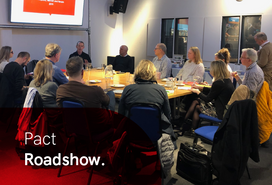The COVID-19 pandemic has impacted all of our lives, but how are Pact members adapting? We’ve asked them to share their lockdown lessons and reflections on where the industry might go from here.

William Skidmore is Business Affairs Manager for Derry based Alleycats Films, who make non-scripted content across a range of genres. Recent productions include; Raiders of the Lost Past with Janina Ramirez for BBC4/eOne, Keepin Er Country at Home for BBCNI, Pulling With My Parents for RTÉ and upcoming feature documentary The Lost Boys: Belfast’s Missing Children.
International co-productions were key to our business strategy going forward, and with COVID affecting commissioning budgets they appear to be even more important.
How have you adapted to working from home and what does a typical day look like?
My wife and I wrote a COVID treaty at the beginning of lockdown to set working hours and make sure we both actually got dressed every day. Despite it being a bit of a joke, setting those sorts of rules was incredibly beneficial for maintaining a bit of structure throughout lockdown.
I’m normally on the phone intermittently throughout the day to our Head of Production, Judy Wilson and Managing Director, Ed Stobart. We try not to arrange too many zoom meetings through the day so we can have space to be reactive now production is getting back to normal again.
Do you have any caring responsibilities and if so how are you balancing that with your work commitments?
Our first child was born mid-July, so I’m only just getting my head round being a dad now! So far, it’s been great being at home as it’s meant I get to see more of my family without the commute, and we get to have lunch and the odd quick cuddle together.
There’s been the occasional instance that she’s cried loudly in the background when I’ve been on the phone or a zoom call, but everyone has been understanding. Bedtime is now 9:00pm, it’s the only way to get enough sleep to function during the day!
Video calls and virtual meetings: love them or hate them?
We’ve three offices; Derry, our main production office, Belfast and London, so even without COVID we’re used to having video calls as we’re often in different places. In some ways they can be quite effective when running through production schedules or budgets but Zoom fatigue has definitely hit me a few times.
The biggest challenge was the uncertainty at the very beginning of lockdown… I had an enormous spreadsheet working out the permutations of every eventuality.
As a business leader, what has been your biggest challenge during the crisis?
The biggest challenge was the uncertainty at the very beginning of lockdown. We had no idea how many of our productions would be able to continue and in what capacity or how staffing would be affected, and the information coming through from the government was changing literally every hour. I had an enormous spreadsheet working out the permutations of every eventuality. Thankfully, the bulk of our commissions have been able to continue, even the ones with international travel, and we’ve been working nonstop.
How have you had to adapt your business strategy in light of the on-going impact of COVID-19?
Building on the success of last year with the likes of Tiananmen: The Party vs The People and Lost Pharaohs of the Nile, international co-productions were key to our business strategy going forward, and with COVID affecting commissioning budgets, they appear to be even more important. Conquering the US is the next target!
What or who in the industry has inspired you most since the pandemic began and why?
Northern Ireland Screen have been outstanding as ever. They’ve lobbied hard for the industry in Northern Ireland and have been hugely supportive to us and other indies throughout the crisis. They’re one of the best organisations around and are a real asset to the creative industries.
Also, Ed Stobart who saw the pandemic coming back in January and supplied the entire office with enough hand sanitiser for the next year. We thought he was just being paranoid!
What’s the best piece of career advice you’ve ever been given?
Not strictly career advice but, when things start piling on and you can feel the pressure on your shoulders mounting, to stop and take a deep breath (or several).
I had high hopes of finally getting around to watching The Wire and The Sopranos... If I couldn’t manage it through lockdown, I fear I never will.
What films and TV series have been helping you get through the lockdown?
Normal People was excellent. I try not to binge anything these days, to properly savour every episode, but it was difficult with this. Paul Mescal should win every award going.
I had high hopes of finally getting around to watching The Wire and The Sopranos during lockdown, but that never materialised. If I couldn’t manage it through lockdown, I fear I never will.
What lasting change do you hope we might see in the industry after this crisis is over?
The lack of financial support for freelancers in the industry has been concerning. Whilst the furlough scheme has been generally successful, too many people have fallen through the cracks on technicalities and left in dire circumstances.
France has a freelancer national insurance system called the intermittence du spectacle that specifically helps cover freelancers who work in TV, Film and Theatre when out of work, and runs normally even without a global pandemic. If the UK could introduce something similar, I know a lot of people would sleep better at night.
Pact would like to thank William for taking the time to answer our questions.
If you would like to feature in our member interview series, please e-mail membercomms@pact.co.uk.



